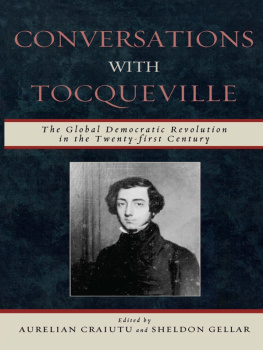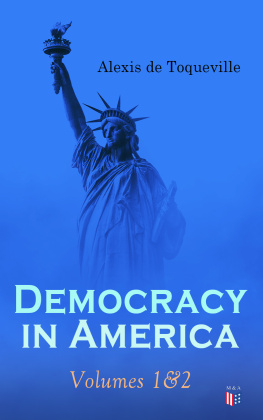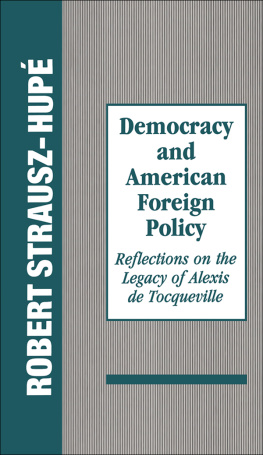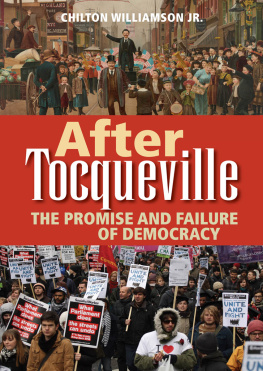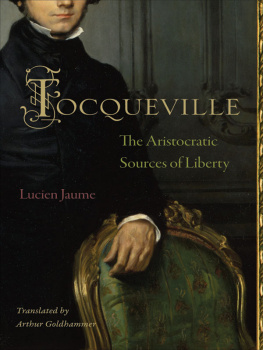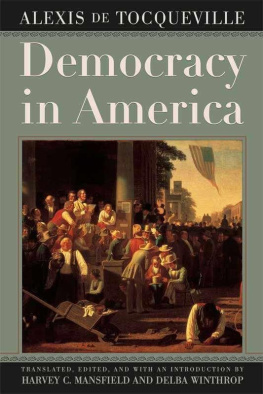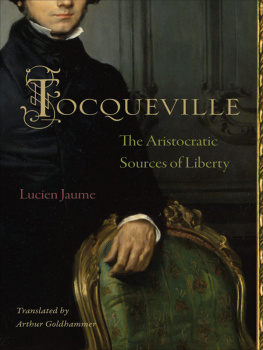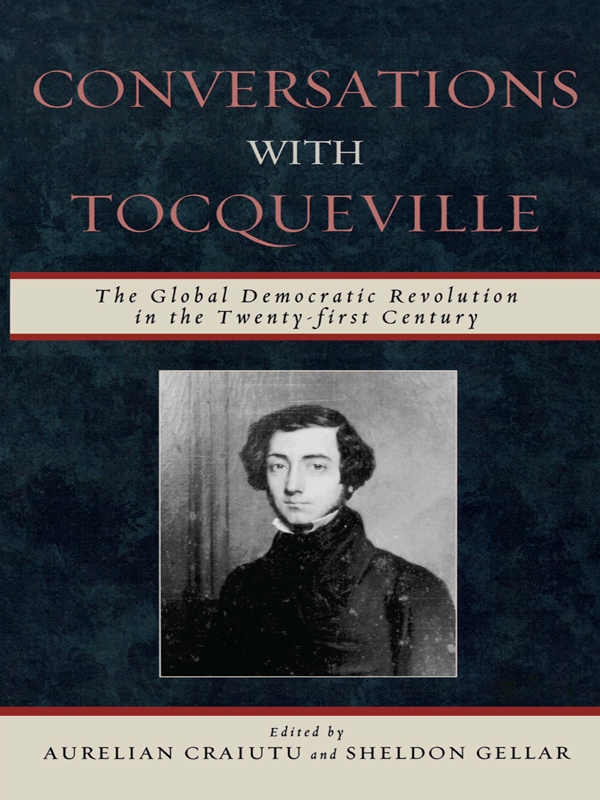Acknowledgments
The publication of this book coincides with the commemoration of 150 years from Tocquevilles death. Conversations with Tocqueville was initially inspired by our participation in the Tocqueville panel at the WOW3 conference organized by the Workshop in Political Theory and Policy Analysis in Bloomington in May 2004 and the commemoration of Tocquevilles bicentenary at the same institution in April 2005.
We would like to express our gratitude to all those who accepted our invitation to contribute to this volume. The completion of our project would have not been possible without the generous financial support provided by the Earhart Foundation and Indiana Universitys Workshop in Political Theory and Policy Analysis, the College Arts & Humanities Institute, the West European Studies, the Department of Political Science, and the Office of International Scholars at Indiana University.
We also want to express our deepest gratitude to Elinor Ostrom and Vincent Ostrom, co-founders of the Workshop and the Tocqueville Endowment for the Study of Human Institutions, who have been among the greatest supporters of our project and were extremely generous in sharing with us their insights and suggestions. Csilla Kajtar served as research assistant for this project and we would like to thank her for her assistance. We would also like to thank Patty Lezotte for her superb editorial assistance and Gayle Higgins, Jacqui Bauer, and Carol Buszkiewicz for their invaluable help at various stages of this project. Many individuals provided useful comments and suggestions on previous drafts of the book. In particular, we would like to thank Cheryl Welch, Jeremy Jennings, Filippo Sabetti, and Barbara Allen, who were extremely generous to share with us their insights on the topics discussed in this book.
During the past three decades, the Workshop in Political Theory and Policy Analysis has been a vital presence on Indiana Universitys Bloomington campus. It has provided a unique environment for vibrant academic exchanges and created a truly engaging intellectual community that includes many contributors to the present volume. Numerous colleagues, friends, students, and librarians have helped us with their generous assistance. Special thanks are due to Amos Sawyer, Mike McGinnis, Jeffrey Isaac, and Russell Hanson for their comments and suggestions, and to Alin Fumurescu for providing the index to this volume. Finally, we would like to express our thanks to Lexington Books, in particular to Serena Krombach and Joseph Parry, for their encouragement, patience, and faith in our project at the heart of which lie democracys hopes and prospects in the twenty-first century
Contributors
Barbara Allen is professor and former chair of the Department of Political Science at Carleton College, Northfield, Minnesota. Professor Allen writes extensively on applying Tocquevilles theories to contemporary politics and policy. Her most recently published book is Tocqueville, Covenant, and the Democratic Revolution: Harmonizing Earth with Heaven (2005). Other publications include her research on Martin Luther King Jr.s contributions to American political thought. She has served as a contributing editor for the Martin Luther King Jr. Papers Project at Stanford University and as a fellow at the Mondale Policy Forum at the Hubert H. Humphrey Institute of Public Affairs.
Krister Andersson is assistant professor in environmental policy at the University of Colorado at Boulder. He received his Ph.D. in Public Policy from Indiana University in 2002. In 2007, he was awarded the Giorgio Ruf folo Research Fellowship by Harvard University for his research on public policy reforms and their mixed effects on rural development and natural resource governance in Latin America. His work has appeared in several journal articles and in three booksthe latest one is coauthored with Gustavo Gordillo de Anda and Frank van Laerhoven and is entitled Local Governments and Rural Development: Comparing Lessons from Brazil, Chile, Mexico, and Peru (University of Arizona Press, 2008).
Aurelian Craiutu is associate professor in the Department of Political Science at Indiana University, Bloomington. He is the author of Liberalism under Siege: The Political Thought of the French Doctrinaires (2003), which won a 2004 CHOICE Outstanding Academic Title Award; Le Centre introuvable (2006); and In Praise of Moderation (2006; in Romanian). Dr. Craiutu also edited Guizots History of the Origins of Representative Government in Europe (2002). He is currently working on a book on political moderation entitled The Extremism of the Center: Faces of Moderation in Modern Political Thought, exploring various aspects of moderation in modern political thought. Professor Craiutu has translated and edited (with Jeremy Jennings) a new volume of Tocquevilles writings, Tocqueville on America after 1840: Letters and Other Writings (Cambridge University Press, 2009), and co-edited (with Jeffrey C. Isaac) a volume entitled America through European Eyes (Penn State University Press, 2009). He also edited a new translation of Madame de Stals Considerations on the Principal Events of the French Revolution (Liberty Fund, 2008).
Frederic Fransen received his Ph.D. in 1996 from the Committee on Social Thought at the University of Chicago, under the direction of the late Franois Furet. He is the author of The Supranational Politics of Jean Monnet (2001). Dr. Fransen is president of Donor Advising, Research, and Educational Services, which assists philanthropists with their higher education and other major gifts, and a Visiting Fellow of the Center on Philanthropy at Indiana University. From 1996 until 2006, he was variously a program officer, fellow, and senior fellow at Liberty Fund Inc. From 2001 to 2006, he also served as director of grants for the Pierre F. and Enid Goodrich Foundation. In 2001, he was a Visiting Fellow at the International Centre for Economic Research in Turin, Italy. From 1988 to 1991, he worked in Brussels, Belgium, as a researcher studying European Community and NATO security policy. Fransen has spent extensive time living and studying European politics and culture, having conducted research in Belgium, France, Germany, Switzerland, and Italy.
Sheldon Gellar is a research associate at Indiana Universitys Workshop in Political Theory and Policy Analysis. One of the first scholars to systematically apply Tocquevilles methodology to the analysis of non-Western societies, Gellar is the author of Democracy in Senegal: Tocquevillian Analytics in Africa (2005), Structural Changes and Colonial Dependency: Senegal 1885-1945 (1976), and Senegal: An African Nation Between Islam and the West (1995). He is currently completing a book-length manuscript on religion and politics in Africa for Lynne Rienner Publishers. Dr. Gellar has taught at Indiana University, Michigan State University, and the Hebrew University of Jerusalem and was a research associate at Princeton University (1982-83) and the Harry S. Truman Institute for the Advancement of Peace (1989-2001).
Gustavo Gordillo de Anda has been a practitioner, academician, and policymaker in agriculture, rural, and regional development issues. As a practitioner, he has been co-founder of a seventy-five rural organizations network in Mexico (UNORCA-La Union Nacional de Organizaciones Regionales Campesinas Autnomas). Dr. Gordillo de Anda holds a Doc-torat de Troisime Cycle from the cole Practique des Hautes tudes, Paris, France. He has been a visiting professor at various universities in Mexico and the United States and is author of more than twenty books and eighty articles. From 1988 to 1994, he served as Vice-Minister of Agriculture and Undersecretary of Agrarian Reform to the Government of Mexico. Between 1995 and 2005, he served as Director for Rural Development in FAOs headquarters and Assistant Director-General, Regional Representative of FAO for Latin America and the Caribbean based in Santiago de Chile. Dr. Gordillo de Anda was a visiting scholar at the Workshop in Political Theory and Policy Analysis at Indiana University from 2006 to 2008.

